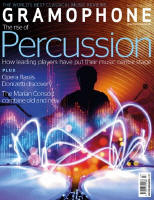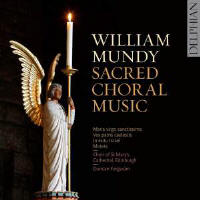Texte paru dans: / Appeared in: |
|
|
Outil de traduction (Très approximatif) |
|
|
Reviewer:
Fabrice Fitch Recordings entirely devoted to William Mundy don’t abound; the most recent seems to be The Sixteen’s almost 20 years ago (Hyperion, 1/90), which included English-texted works as well as Latin. Here the focus is entirely on the latter, including the justly famous and oft-recorded Vox patris caelestis. Another lengthy work, In exitu Israel is a collaborative piece, to whose verse structure Sheppard and the youthful Byrd also contributed. But the gem of this particular recital is Maria virgo sanctissima, which rivals Vox Patris in scale. It has waited until now to be heard, for it is incomplete in its only source and has been reconstructed by Magnus Williamson, one of the pre-eminent scholars of this period. He’s done a sterling job: the final ‘Amen’ is the passage that most strongly validates the effort of making the work performable once again. Some shorter selections round out the programme. Two impressive, short settings of Alleluia: Per te Dei genetrix, both claimed as premiere recordings, provide some respite from the surrounding leviathans. The equally concise Beatus et sanctus is a lovely opener, and Sive vigilem is pithy in another way, avoiding melismas. On this showing, Mundy’s range is greater than some modern commentators give him credit for. The Choir of St Mary’s, Edinburgh, has a fine track record in this repertory, and the novelty value of this recital warrants a strong recommendation. The shorter selections are especially well handled, for they don’t tax the singers unduly. In the lengthier selections they convey the sense of large-scale architecture even when the details flag. The imbalance of timbre between the straight-toned trebles (mixed, in this choir) and the lower voices obtrudes more than one might wish but that’s not unknown in collegiate institutions. For what it’s worth, the countertenor soloist audibly outclasses most of his adult colleagues, but at the start of Vox Patris his cameo upstages the first appearance of the trebles. (The Choir of Westminster Abbey’s account – Hyperion, 12/08 – gets round this by assigning that part to lower trebles.) I also like Duncan Ferguson’s forthright (dare I say it, un-churchy) approach to the lengthy passages of plainchant. |
|




